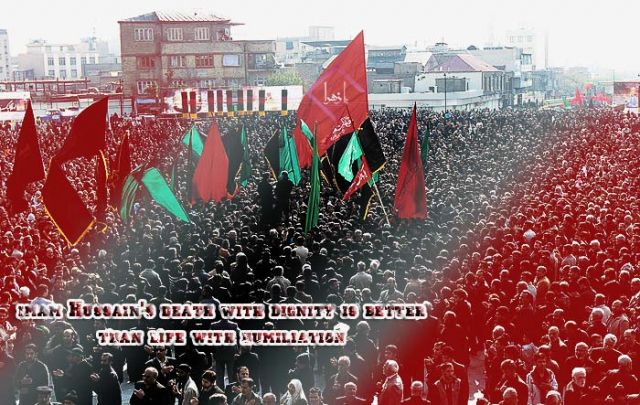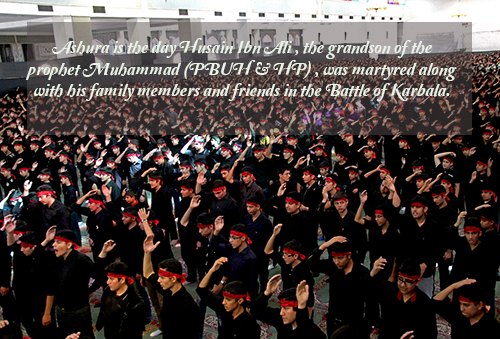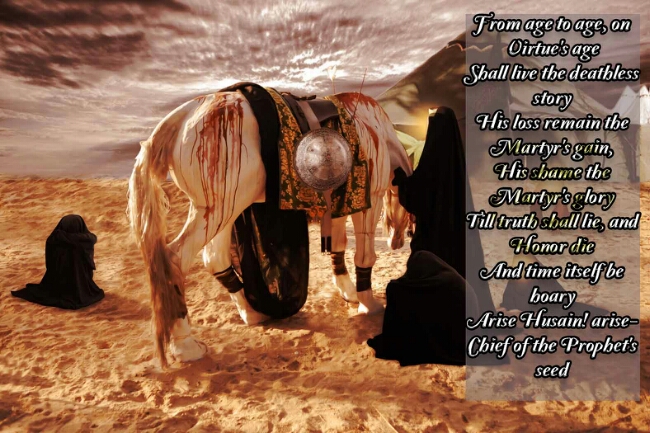| |
|
|
 Hazrat Abulfadhl Al-Abbas’s loyalty was most clearly manifested when he went to the Euphrates River but abstained from drinking water. The well-known narration of the event, which is widely related to by the people, is that Imam Hussain (as) sent Hazrat Abulfadhl to fetch water. However, what I have read in authentic versions of the narration—like those of “Irshad” by Mufid and “Lohoof” by Ibn Tawous—is slightly different from the common narration, probably highlighting the significance of the event. In these authentic books it has been narrated that in the last moments, rather in the last hour, while thirst had compelled the little children so much–little girls and others in the camps–that Imam Hussain (as) and Abulfadhl (as) took it upon themselves and left together to fetch water. Hazrat Abulfadhl did not go alone, in other words; Imam Hussain (as) accompanied Abulfadhl towards the Euphrates River—a branch of the Euphrates which flowed through that region—in hopes of obtaining water for the camp site. Hazrat Abulfadhl Al-Abbas’s loyalty was most clearly manifested when he went to the Euphrates River but abstained from drinking water. The well-known narration of the event, which is widely related to by the people, is that Imam Hussain (as) sent Hazrat Abulfadhl to fetch water. However, what I have read in authentic versions of the narration—like those of “Irshad” by Mufid and “Lohoof” by Ibn Tawous—is slightly different from the common narration, probably highlighting the significance of the event. In these authentic books it has been narrated that in the last moments, rather in the last hour, while thirst had compelled the little children so much–little girls and others in the camps–that Imam Hussain (as) and Abulfadhl (as) took it upon themselves and left together to fetch water. Hazrat Abulfadhl did not go alone, in other words; Imam Hussain (as) accompanied Abulfadhl towards the Euphrates River—a branch of the Euphrates which flowed through that region—in hopes of obtaining water for the camp site.
These two courageous and strong brothers fought while backing each other on the battle field. Imam Hussain (as) was about sixty years old, but he was among famous unique men in terms of his power and courage. His brother Abulfadhl al-Abbas was in his 30’s with all these outstanding features known to everyone. These two brothers would fight side by side, and back to back, in the midst of the enemy’s army, moving into the waves of enemy lines, breaking them. They did so in order to reach to the Euphrates in hopes they could get some water. It was in the midst of this challenging battle that Imam Hussain realized, suddenly, that the enemy had created a gap between him and his brother Abulfadhl Al-Abbas. It was also in the midst of those tough moments that Abulfadhl got closer to water and reached the Euphrates. As it has been narrated, he filled the water pouch to take it back to the camp. Anyone would agree he had the right to drink a fistful of water to sooth his own thirst, but he demonstrated his loyalty in that moment.
When Abulfadhl Al-Abbas was filling his palms with water, when he looked at the water, he remembered Imam Hussain’s lips, dry from thirst; maybe he remembered the little girls and other children screaming out for thirst. Maybe he remembered Ali Asghar crying out for thirst and he could not allow himself to drink water. He poured the fresh water onto his hands, it seeped out and back into the river before he left. It was when he was leaving the river that the enemy targeted him, and all those horrible events unraveled. Suddenly Imam Hussain (as) heard his brother from the midst of the enemy’s army calling out to him: “O’ Brother! Help your brother!”
Ayatollah Khamenei, April 14, 2000
موضوعات: ashura, ashura
لینک ثابت
|
[سه شنبه 1396-05-24] [ 04:27:00 ب.ظ ]
|
|

As the enemies had the body of Imam Hussain (as) surrounded, each took their turn stabbing his pure defenseless body, laid out on the ground; thus, while viciousness, revengefulness, and feral behavior swept through the battle field, in the camps of Imam Hussain (as) the spirit of remembrance in God, the human quality of tenderness, and intense emotions prevailed.
All women and children—no one but women and children were left in the camps, with the exception of the only surviving male Ali Ibn Hussain (as) who was ill—were worried about Hussain Ibn Ali (as) and what would transpire next.
They came out of their tents, and proceeded to the area where they believed Hussain Ibn Ali’s (as) body was seized; it has been narrated that the women departed from the camp. You have probably seen or heard how Arab women weep and mourn: it is still common among Arab women to mourn painfully upon the death of their loved ones; they beat their own faces, and pull at their hair; they mourn in such an intense manner. Well, these women had lost a loved one, a man like Hussain Ibn Ali (as).
Hazrat Zeinab was heading the women towards the sight of his martyrdom. When she arrived, she spotted the body of her beloved brother on the blistering grounds of Karbala. Instead of revealing some sort of reaction, or grievance, she went to the corpse of her beloved Hussain (as), and called on her grandfather (pbuh). She said, “O’ the Messenger of God, peace be upon you! Take a look at your Hussain who is covered in blood, with his body hacked up.” O’ my dear grandfather! O’ Great Prophet, look towards the hot desert of Karbala. This is your Hussain who is now covered in blood and dust.
Then, as it has been narrated, Zeinab (as) reached her hands beneath the body of Hussain Ibn Ali (as) and called out, “O’ God! Please accept this sacrifice from the progeny of Muhammad (saw)!”
Ayatollah Khamenei, 9/27/1985
موضوعات: ashura, ashura
لینک ثابت
|
[سه شنبه 1396-05-03] [ 11:43:00 ق.ظ ]
|
|

The concept of guardianship was embodied by Imam Hussein (a.s.) with all its dimensions and with all the necessary and possible means. This is not to say that others did not do such a thing or did not want to do such a thing, rather it means that this movement was fully realized in the behavior of the Lord of the Martyrs (a.s.) during his ten-year imamate. One can clearly notice in his lifestyle all the methods that could have been used by a descendant of the Holy Prophet (s.w.a.) to preserve the great legacy of Islam which has been passed down by the Holy Prophet (s.w.a.) and his father as well as their genuine followers. We can clearly see everything in the lifestyle of the Lord of the Martyrs (a.s.) - everything ranging from clarification, to forewarning, to promotion of Islam, to provoking the conscience of prominent figures of his time during a sermon in Mina. All these things are tangible in the lifestyle of the Lord of the Martyrs (a.s.). Later on he stood up against a great deviation and laid down his life. Imam Hussein (a.s.) was aware of the consequences of his movement. He was an infallible Imam. Infallible Imams’ extensive knowledge and insight are beyond our heads. Imam Hussein (a.s.) revolted to set a role model and he refused to surrender. He asked people to help him and when a group of people from Kufa expressed their willingness to accompany him on this path, Imam Hussein (a.s.) accepted their offer and moved towards Kufa and he did not give up in the middle of the way. Imam Hussein (a.s.) stood up against the deviated current of his time, which was extremely dangerous. And this became a lesson and Imam Hussein (a.s.) himself makes the same point. That is to say, he backed up his action with the order of Islam. He said that his duty was what he was doing. He said that he had to express his opposition, no matter what the consequences were. He said, “It is good if my destiny is a victory and if my destiny is martyrdom, so much the better.” This was how Imam Hussein (a.s.) acted.
This was a perfect instance of self-sacrifice and it safeguarded Islam. This move preserved Islam. This move institutionalized values in society. If Imam Hussein (a.s.) had not accepted this danger, if he had not made a move, if he had not taken action, if his blood had not been shed, if those great tragedies had not happened to the shrine of the Holy Prophet (s.w.a.), to Imam Ali’s (a.s.) daughter and to the Holy Prophet’s (s.w.a.) descendents, this event would not have gone down in history. The event that could have prevented that great deviation had to shock people and history as much as the deviation did. This shows Imam Hussein’s (a.s.) self-sacrifice.
Of course this is easier said than done. What Imam Hussein (a.s.) did was an extraordinary feat. That is to say, the dimensions of his action are far more than what we estimate. We usually ignore aspects and details. Once I spoke about Imam Hussein’s (a.s.) patience. His patience was not limited to enduring thirst or seeing his companions being killed. These things are relatively easy to tolerate. The kind of patience that is difficult to practice is to listen to influential, aware and respectable people who keep creating doubts and telling you that what you are doing is dangerous and wrong. Who did those things? People like Abdullah Ja’far, Abdullah Zubair and Abdullah Abbas. These prominent figures of that time were constantly telling Imam Hussein (a.s.) not to do what he was doing. If it were somebody else, somebody who did not have that determination and stable character, he would have thought, “Well, I did my duty. These people are talking like this and the world is acting like that, so I should just say what I am supposed to say and do nothing else.” A person who decides to stand up against such statements, such temptations, such doubts and such efforts to bend sharia and is not dissuaded from continuing his path - such a person is the one who can give rise to such a
great transformation. In this regard our magnanimous Imam (r.a.) was similar to the Lord of the Martyrs. I explained this in another meeting and I do not want to go into the details now. This was how Imam Hussein (a.s.) acted as a guardian.
Statements made during an address to members of IRGC; July 4, 2011.
موضوعات: ashura, ashura
لینک ثابت
|
[شنبه 1396-04-31] [ 11:35:00 ق.ظ ]
|
|
|
|
|
 Hazrat Abulfadhl Al-Abbas’s loyalty was most clearly manifested when he went to the Euphrates River but abstained from drinking water. The well-known narration of the event, which is widely related to by the people, is that Imam Hussain (as) sent Hazrat Abulfadhl to fetch water. However, what I have read in authentic versions of the narration—like those of “Irshad” by Mufid and “Lohoof” by Ibn Tawous—is slightly different from the common narration, probably highlighting the significance of the event. In these authentic books it has been narrated that in the last moments, rather in the last hour, while thirst had compelled the little children so much–little girls and others in the camps–that Imam Hussain (as) and Abulfadhl (as) took it upon themselves and left together to fetch water. Hazrat Abulfadhl did not go alone, in other words; Imam Hussain (as) accompanied Abulfadhl towards the Euphrates River—a branch of the Euphrates which flowed through that region—in hopes of obtaining water for the camp site.
Hazrat Abulfadhl Al-Abbas’s loyalty was most clearly manifested when he went to the Euphrates River but abstained from drinking water. The well-known narration of the event, which is widely related to by the people, is that Imam Hussain (as) sent Hazrat Abulfadhl to fetch water. However, what I have read in authentic versions of the narration—like those of “Irshad” by Mufid and “Lohoof” by Ibn Tawous—is slightly different from the common narration, probably highlighting the significance of the event. In these authentic books it has been narrated that in the last moments, rather in the last hour, while thirst had compelled the little children so much–little girls and others in the camps–that Imam Hussain (as) and Abulfadhl (as) took it upon themselves and left together to fetch water. Hazrat Abulfadhl did not go alone, in other words; Imam Hussain (as) accompanied Abulfadhl towards the Euphrates River—a branch of the Euphrates which flowed through that region—in hopes of obtaining water for the camp site.

